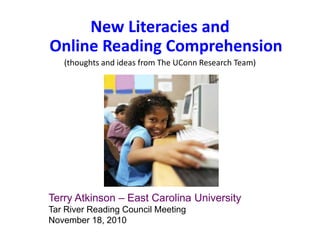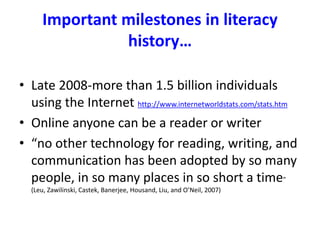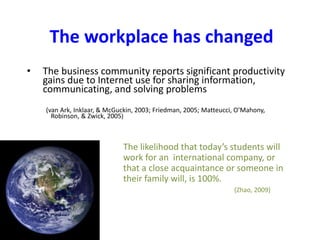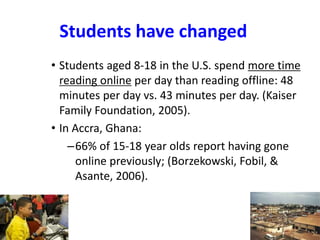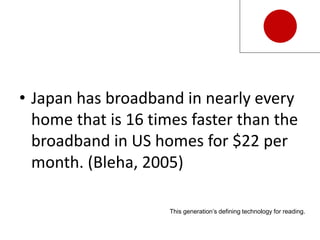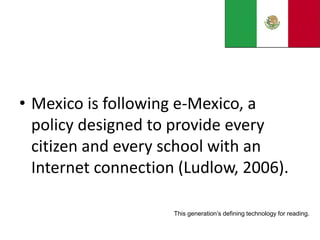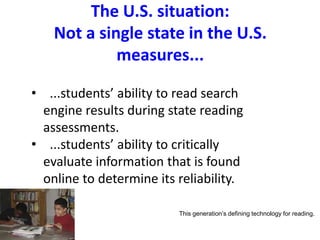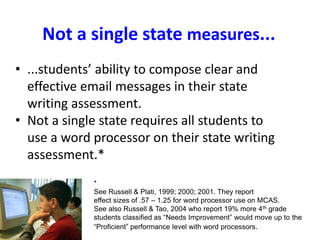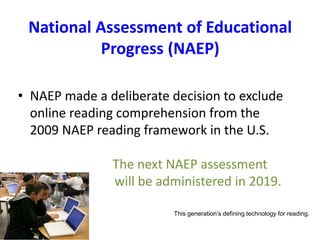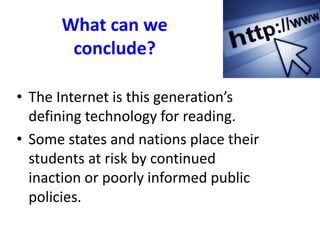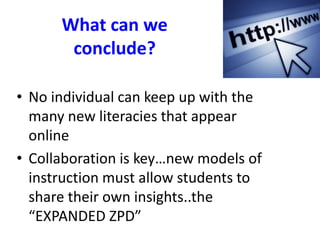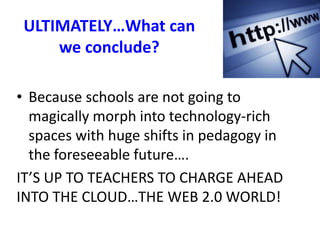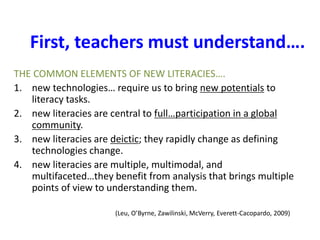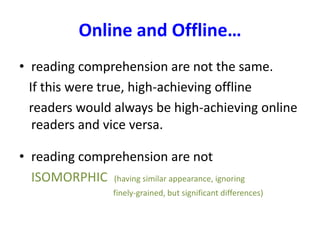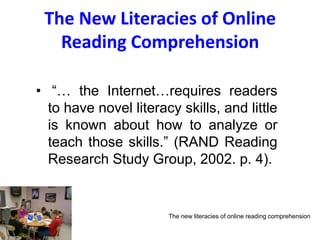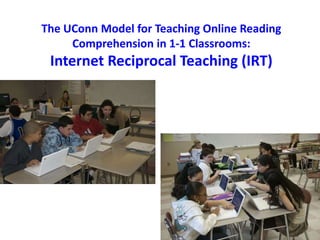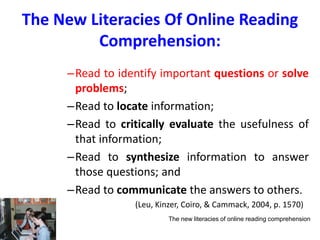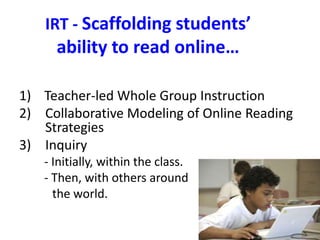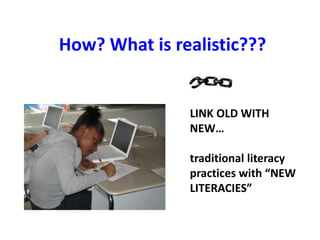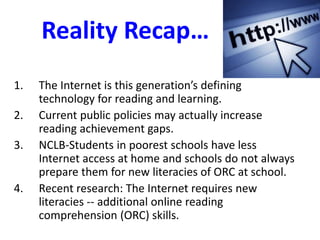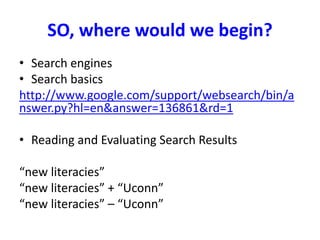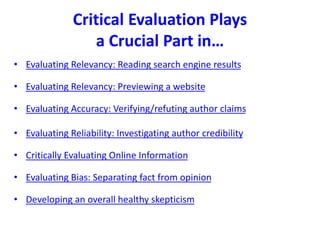TRRC
- 1. New Literacies and Online Reading Comprehension (thoughts and ideas from The UConn Research Team) Terry Atkinson ŌĆō East Carolina University Tar River Reading Council Meeting November 18, 2010
- 3. Important milestones in literacy historyŌĆ” ŌĆó Late 2008-more than 1.5 billion individuals using the Internet http://www.internetworldstats.com/stats.htm ŌĆó Online anyone can be a reader or writer ŌĆó ŌĆ£no other technology for reading, writing, and communication has been adopted by so many people, in so many places in so short a timeŌĆØ (Leu, Zawilinski, Castek, Banerjee, Housand, Liu, and OŌĆÖNeil, 2007)
- 4. The workplace has changed ŌĆó The business community reports significant productivity gains due to Internet use for sharing information, communicating, and solving problems (van Ark, Inklaar, & McGuckin, 2003; Friedman, 2005; Matteucci, OŌĆÖMahony, Robinson, & Zwick, 2005) The likelihood that todayŌĆÖs students will work for an international company, or that a close acquaintance or someone in their family will, is 100%. (Zhao, 2009)
- 5. Students have changed ŌĆó Students aged 8-18 in the U.S. spend more time reading online per day than reading offline: 48 minutes per day vs. 43 minutes per day. (Kaiser Family Foundation, 2005). ŌĆó In Accra, Ghana: ŌĆō66% of 15-18 year olds report having gone online previously; (Borzekowski, Fobil, & Asante, 2006).
- 6. ŌĆó Japan has broadband in nearly every home that is 16 times faster than the broadband in US homes for $22 per month. (Bleha, 2005) This generationŌĆÖs defining technology for reading.
- 7. ŌĆó Mexico is following e-Mexico, a policy designed to provide every citizen and every school with an Internet connection (Ludlow, 2006). This generationŌĆÖs defining technology for reading.
- 8. The U.S. situation: Not a single state in the U.S. measures... ŌĆó ...studentsŌĆÖ ability to read search engine results during state reading assessments. ŌĆó ...studentsŌĆÖ ability to critically evaluate information that is found online to determine its reliability. This generationŌĆÖs defining technology for reading.
- 9. Not a single state measures... ŌĆó ...studentsŌĆÖ ability to compose clear and effective email messages in their state writing assessment. ŌĆó Not a single state requires all students to use a word processor on their state writing assessment.* * See Russell & Plati, 1999; 2000; 2001. They report effect sizes of .57 ŌĆō 1.25 for word processor use on MCAS. See also Russell & Tao, 2004 who report 19% more 4th grade students classified as ŌĆ£Needs ImprovementŌĆØ would move up to the ŌĆ£ProficientŌĆØ performance level with word processors.
- 10. National Assessment of Educational Progress (NAEP) ŌĆó NAEP made a deliberate decision to exclude online reading comprehension from the 2009 NAEP reading framework in the U.S. The next NAEP assessment will be administered in 2019. This generationŌĆÖs defining technology for reading.
- 11. What can we conclude? ŌĆó The Internet is this generationŌĆÖs defining technology for reading. ŌĆó Some states and nations place their students at risk by continued inaction or poorly informed public policies.
- 12. What can we conclude? ŌĆó No individual can keep up with the many new literacies that appear online ŌĆó Collaboration is keyŌĆ”new models of instruction must allow students to share their own insights..the ŌĆ£EXPANDED ZPDŌĆØ
- 13. ULTIMATELYŌĆ”What can we conclude? ŌĆó Because schools are not going to magically morph into technology-rich spaces with huge shifts in pedagogy in the foreseeable futureŌĆ”. ITŌĆÖS UP TO TEACHERS TO CHARGE AHEAD INTO THE CLOUDŌĆ”THE WEB 2.0 WORLD!
- 14. First, teachers must understandŌĆ”. THE COMMON ELEMENTS OF NEW LITERACIESŌĆ”. 1. new technologiesŌĆ” require us to bring new potentials to literacy tasks. 2. new literacies are central to fullŌĆ”participation in a global community. 3. new literacies are deictic; they rapidly change as defining technologies change. 4. new literacies are multiple, multimodal, and multifacetedŌĆ”they benefit from analysis that brings multiple points of view to understanding them. (Leu, OŌĆÖByrne, Zawilinski, McVerry, Everett-Cacopardo, 2009)
- 15. Online and OfflineŌĆ” ŌĆó reading comprehension are not the same. If this were true, high-achieving offline readers would always be high-achieving online readers and vice versa. ŌĆó reading comprehension are not ISOMORPHIC (having similar appearance, ignoring finely-grained, but significant differences)
- 16. The New Literacies of Online Reading Comprehension ŌĆó ŌĆ£ŌĆ” the InternetŌĆ”requires readers to have novel literacy skills, and little is known about how to analyze or teach those skills.ŌĆØ (RAND Reading Research Study Group, 2002. p. 4). The new literacies of online reading comprehension
- 17. The UConn Model for Teaching Online Reading Comprehension in 1-1 Classrooms: Internet Reciprocal Teaching (IRT)
- 18. The New Literacies Of Online Reading Comprehension: ŌĆōRead to identify important questions or solve problems; ŌĆōRead to locate information; ŌĆōRead to critically evaluate the usefulness of that information; ŌĆōRead to synthesize information to answer those questions; and ŌĆōRead to communicate the answers to others. (Leu, Kinzer, Coiro, & Cammack, 2004, p. 1570) The new literacies of online reading comprehension
- 19. IRT - Scaffolding studentsŌĆÖ ability to read onlineŌĆ” 1) Teacher-led Whole Group Instruction 2) Collaborative Modeling of Online Reading Strategies 3) Inquiry - Initially, within the class. - Then, with others around the world.
- 20. How? What is realistic??? LINK OLD WITH NEWŌĆ” traditional literacy practices with ŌĆ£NEW LITERACIESŌĆØ
- 21. Reality RecapŌĆ” 1. The Internet is this generationŌĆÖs defining technology for reading and learning. 2. Current public policies may actually increase reading achievement gaps. 3. NCLB-Students in poorest schools have less Internet access at home and schools do not always prepare them for new literacies of ORC at school. 4. Recent research: The Internet requires new literacies -- additional online reading comprehension (ORC) skills.
- 22. SO, where would we begin? ŌĆó Search engines ŌĆó Search basics http://www.google.com/support/websearch/bin/a nswer.py?hl=en&answer=136861&rd=1 ŌĆó Reading and Evaluating Search Results ŌĆ£new literaciesŌĆØ ŌĆ£new literaciesŌĆØ + ŌĆ£UconnŌĆØ ŌĆ£new literaciesŌĆØ ŌĆō ŌĆ£UconnŌĆØ
- 23. Critical Evaluation Plays a Crucial Part inŌĆ” ŌĆó Evaluating Relevancy: Reading search engine results ŌĆó Evaluating Relevancy: Previewing a website ŌĆó Evaluating Accuracy: Verifying/refuting author claims ŌĆó Evaluating Reliability: Investigating author credibility ŌĆó Critically Evaluating Online Information ŌĆó Evaluating Bias: Separating fact from opinion ŌĆó Developing an overall healthy skepticism
- 24. Continuing the conversationŌĆ” ŌĆó Article by Leu, D.J., OŌĆÖByrne, W.I., Zawilinski, L., McVerry, J. G., Everett-Cacopardo, H., 2009. Educational Researcher, 38, 4, 264-269. doi 10.3102/0013189X09336676. Available online at: http://edr.sagepub.com/content/38/4/264.full .pdf+html ŌĆó TeacherŌĆÖs Activity Guide
- 25. REFERENCESŌĆ” ŌĆó Leu, D.J., OŌĆÖByrne, W.I., Zawilinski, L., McVerry, J. G., Everett-Cacopardo, H., 2009. Educational Researcher, 38, 4, 264-269. doi 10.3102/0013189X09336676. Available online at: http://edr.sagepub.com/content/38/4/264.full.pdf+html ŌĆó Leu D. J., Zawilinski, L. , Castek, J., Banerjee, M., Housand, B., Liu, Y. & OŌĆÖNeil, M., (2007). What is new about the new literacies of online reading comprehension? In L. S. Rush, A. J. Eakle, & A. Berger (Eds.), Secondary school literacy: What research reveals for classroom practice. Urbana, IL: NCTE. ŌĆó Zhao, Y. (2009). Catching up or leading the way: Education in the age of globalization. Alexandria, VA: ASCD.
Editor's Notes
- #3: ----- Meeting Notes (11/17/10 19:58) -----None of us would argue with the fact that just as our world has experienced (and continues to experience) DRAMATIC CHANGES during the last two decades, so has how we read and write. Here's what I used to learn to read in ELEM school. Here is what I use to read now.....
- #4: At this rate, > half of worldŌĆÖs population will be online in 7 years, MOST of world online in the next 10-15 yearsMention motivationŌĆ”writing for REAL audiences highly impacts motivation
- #22: Knobel and Lankshear document that it is the MOST efficient system in our history for delivering new technologies to read, write, and communicate!Poorer schools are under greatest pressure to raise test scores that have NOTHING to do with online reading comprehension (Henry, 2007)
- #23: LINK OLD to NEWFRAMING THE INTERNET AS A LITERACY ISSUE, NOT A TECHNOLOGY ISSUE..INTERNET INSTRUCTION INTEGRATED INTO ALL SUBJECT AREAS, TAUGHT BY ALL TEACHERS

